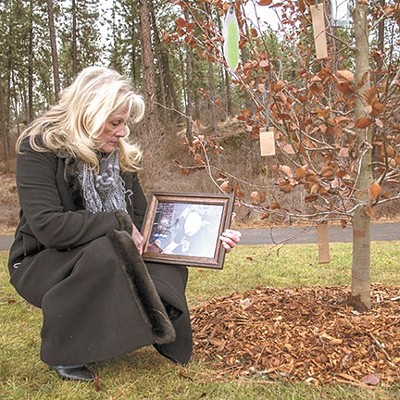
The Sunday football game — Saints against the 49ers — plays quietly on the TV in the background, as 36-year-old Tim McFarland recounts living with bipolar affective disorder.
"It's not like one day, I'm manic, and one day I'm depressed," McFarland says. It never was like that for him. Instead, he experienced a period of depression lasting years. And then later, a period of mania lasting years.
First came the depression. It started when he was 19, balancing late-night shifts with community college classes.
"This gloom was over me. I was having a hard time getting out of bed. There were weeks where I didn't see the sun, especially in winter," McFarland says.
It got worse from there. "I felt people wanted me to fail, and no one wanted me to succeed. ... I ended up isolating myself, my relationships with my friends deteriorated," he says. "I knew that something was off. I was afraid to leave my apartment. I eventually lost my job and my apartment and my car."
Homeless, jobless, he scraped by on unemployment checks. Sometimes, he went to the Union Gospel Mission shelter for help and meals. He got more desperate. "I went to an old friend's house, went inside, took a shower, made something to eat," McFarland says. "I was charged with burglary."
He pled not guilty by reason of insanity and saved himself from a felony rap. But that meant two years at Eastern State Hospital.
"You know, at first, it was really hard. I guess, [I thought] 'I'm just going to be on Social Security for the rest of my life. This is it,'" he says.
After his conditional release, however, things began to look up. He started taking business classes at Gonzaga University.
"There was still an inkling that I don't need this medication, there's nothing wrong with me," McFarland says. "It's a lesson I learned the hard way: You need the medication when you're doing well just as much as when you're not."
Without medication, his mental health began collapsing again. This time he was hit with mania — the thrilling feeling he was capable of anything. "You do too many things at once," he says. He was a full-time student, juggling two jobs and a relationship. But the cracks were showing — he'd answer test questions with correct answers, but to the wrong questions.
Worse, ditching his medication violated the terms of his conditional release, and he landed back at Eastern State Hospital. "At first I was really angry. I thought I had everything under control," he says. "Once I realized that I have to take control of my own treatment, then I started working with the support system. That's when I started to learn about my illness: How do I get well and stay well?"
His mentality toward the health care system changed: Even when he was stripped of his privileges and his discharge was delayed after an Eastern State Hospital patient wandered away during an outing at a county fair, he kept his spirits up. McFarland began to help other patients prepare for their review boards, prepare for their own discharges.
After his discharge in 2012, McFarland has gone back to Eastern State Hospital several times. But not as a patient. He stands before a crowd of patients at the hospital during Mental Health Awareness Week. "I did a little spiel on recovery and success," he says. He tells them that things are going to get better, but they have to take responsibility for their own recovery.
Today, he works with the family services division of Frontier Behavioral Health, "[empowering mentally ill people] to have the tools to advocate for themselves." When people set their own goals, he says, they're more likely to obtain them.
"You work on just gaining that insight, knowing what you're like when you're well," McFarland says. In his case, he says, "I'm laid-back. I'm sociable. I like to do things." Like a lot of thirtysomethings, he binges on Netflix, plays fantasy football, shoots hoops.
He also serves as treasurer for the Spokane Consumer Advocacy Network, a grassroots group that advocates for the mentally ill.
"I've found it's hard for people to accept, because of the way we're portrayed in the media or Hollywood," McFarland says. "Anytime something heinous or bad happens, they immediately associate mental illness with that problem."
After having spent years talking and living with people with mental illness, and struggling with it himself, he knows better.
"People think that having mental illness is a knock on their character," McFarland says. "It's not. Some of the most charming and bright and intelligent people that I know deal with mental health issues." ♦


























